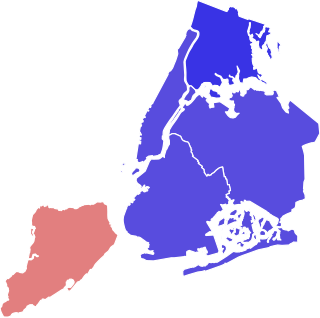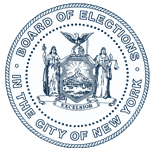
The 2005 New York City mayoral election occurred on Tuesday, November 8, 2005, with incumbent Republican mayor Michael Bloomberg soundly defeating former Bronx borough president Fernando Ferrer, the Democratic nominee. Several third-party candidates also ran for mayor. Bloomberg won four of the five boroughs, the exception being the Bronx.

The Independence Party was a political party in the U.S. state of New York. The party was founded in 1991 by Gordon Black, Tom Golisano, and Laureen Oliver and acquired ballot status in 1994. They lost their ballot status in 2020 under a change in the New York state election law that required at least 130,000 votes on the party line every two years. Although often associated with Ross Perot, as the party came to prominence in the wake of Perot's 1992 presidential campaign, it was created prior to Perot's run. In 2020, it affiliated with the Alliance Party, but disaffiliated in 2021. It used to have one elected member of the New York State Assembly, Fred Thiele, until Thiele switched his party affiliation to the Democratic Party in 2022. On December 9, 2022, New York governor Kathy Hochul signed S1851A, banning the use of the words "Independent" and "Independence" from use in political party names in New York state.

The 2009 election for Mayor of New York City took place on Tuesday, November 3. The incumbent Mayor, Michael Bloomberg, an independent who left the Republican Party in 2008, won reelection on the Republican and Independence Party/Jobs & Education lines with 50.7% of the vote over the retiring City Comptroller, Bill Thompson, a Democrat, who won 46.3%. Thompson had won the Democratic primary election on September 15 with 71% of the vote over City Councilman Tony Avella and Roland Rogers. This was the fifth straight mayoral victory by Republican candidates in New York despite the city's strongly Democratic leaning in national and state elections.

The results of elections in the state of New York have tended to be more Democratic-leaning than in most of the United States, with in recent decades a solid majority of Democratic voters, concentrated in New York City and some of its suburbs, including Westchester County, Rockland County and Long Island's Nassau county, and in the cities of Buffalo, Rochester, Syracuse, Albany, and Ithaca.

The District of Columbia holds general elections every two years to fill various D.C. government offices, including mayor, attorney general, members of the D.C. Council, members of the D.C. State Board of Education, and members of its Advisory Neighborhood Commissions. Special elections may be held to fill vacancies at other points in time. Additionally, citywide ballot measures may be proposed and voted on.

Electoral reform in New York refers to efforts to change the voting and election laws in New York State. In 2021, the New York State Legislature asked New York state voters their opinion through referendums on ballot proposals, all of which were denied by voters.

Elections in New Jersey are authorized under Article II of the New Jersey State Constitution, which establishes elections for the governor, the lieutenant governor, and members of the New Jersey Legislature. Elections are regulated under state law, Title 19. The office of the New Jersey Secretary of State has a Division of Elections that oversees the execution of elections under state law. In addition, the New Jersey Election Law Enforcement Commission (ELEC) is responsible for administering campaign financing and lobbying disclosure.

The 2013 New York City mayoral election occurred on November 5, 2013, along with elections for Comptroller, Public Advocate, Borough President, and members of the New York City Council. The incumbent mayor of New York City, Michael Bloomberg, a Republican-turned-Independent, was term-limited and thus unable to seek re-election to a fourth term in office.

The 1993 New York City mayoral election was held on Tuesday, November 2. Incumbent Mayor David Dinkins ran for re-election to a second term, but lost in a rematch with Republican Rudy Giuliani.

The 2004 San Diego mayoral election was held on Tuesday, November 2, 2004 to elect the mayor for San Diego. Incumbent mayor Dick Murphy stood for reelection for a second term.

The Chicago mayoral election of 1989 saw Democratic nominee Richard M. Daley win election to the remainder of an unexpired mayoral term with a 14% margin of victory. This marked a return for the Daley family to the office of mayor. Daley was elected over Alderman Timothy Evans, the nominee of the newly formed Harold Washington Party, and the Republican nominee Ed Vrdolyak.
Voter suppression in the United States consists of various legal and illegal efforts to prevent eligible citizens from exercising their right to vote. Such voter suppression efforts vary by state, local government, precinct, and election. Voter suppression has historically been used for racial, economic, gender, age and disability discrimination. After the American Civil War, all African-American men were granted voting rights, but poll taxes or language tests were used to limit and suppress the ability to register or cast a ballot. The Civil Rights Act of 1964 and the Voting Rights Act of 1965 improved voting access. Since the beginning of voter suppression efforts, proponents of these laws have cited concerns over electoral integrity as a justification for various restrictions and requirements, while opponents argue that these constitute bad faith given the lack of voter fraud evidence in the United States.
The city government of New York City controls a budget of about $78.3 billion a year, as of 2016. Officials receive municipal funding for their campaigns, and are elected for a maximum of two terms. City government is dominated by the Democratic Party, which also normally attracts majority support within the city in State, Congressional, and Presidential elections. The suffrage has been extended in stages since the founding of the state: African-Americans received the vote in 1870 and women in 1920. Since 1968, electoral district boundaries at all levels have been drawn so as to ensure minority representation.

The 2016 New York Democratic presidential primary was held on April 19 in the U.S. state of New York as one of the Democratic Party's primaries ahead of the 2016 presidential election. Hillary Clinton, who had previously represented New York in the United States Senate from 2001 to 2009, won a comfortable majority in both the popular vote and delegate count over Bernie Sanders, who was born in Brooklyn.

The County Executive of Essex County in the U.S. state of New Jersey, is the chief officer of the county's executive branch and oversees the administration of county government. Approved in a 1977 referendum, the office was inaugurated in 1978 at the same time the Board of Chosen Freeholders, which plays a legislative role, was reconfigured to include a mix of at-large and district seats. The executive offices are located at the Essex County Government Complex in the county seat, Newark. When the first executive was elected in 1978, The New York Times described that the position was "considered by many to be second in power only to that of the Governor."

The Cook County, Illinois, general election was held on November 3, 2020. Elections were held for Clerk of the Circuit Court, State's Attorney, Cook County Board of Review district 1, three seats on the Water Reclamation District Board, and judgeships on the Circuit Court of Cook County.

The Cook County, Illinois, general election was held on November 6, 2018.

The Cook County, Illinois, general elections were held on November 8, 2022. Primaries were held on June 28, 2022.

The Cook County, Illinois, general election was held on November 8, 1994.

The 2021 New York state elections were held on November 2, 2021. In addition to the standard local elections, many seats for the New York Supreme Court were to be filled in addition to ballot proposals regarding changing state electoral rules and court limits.













